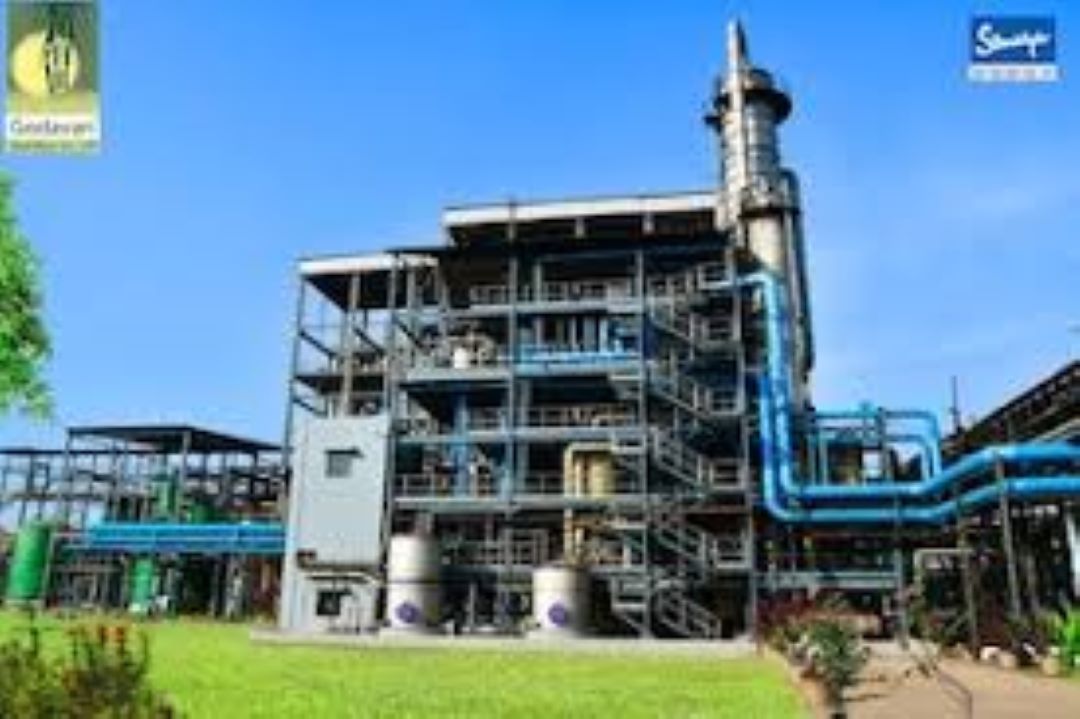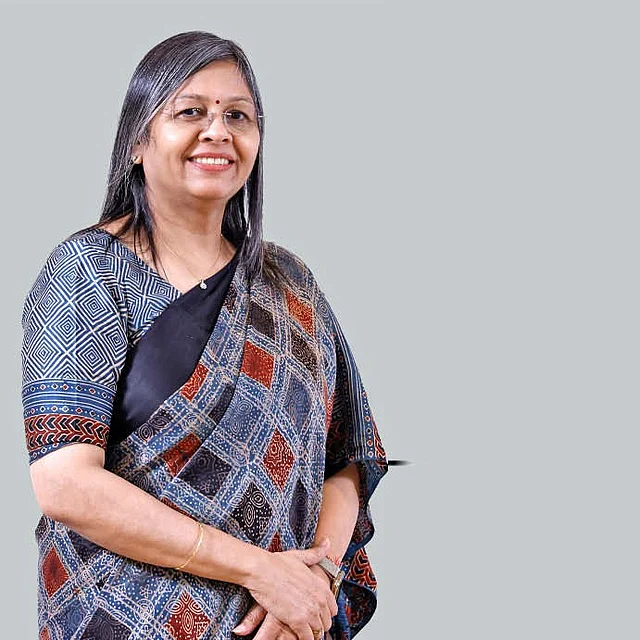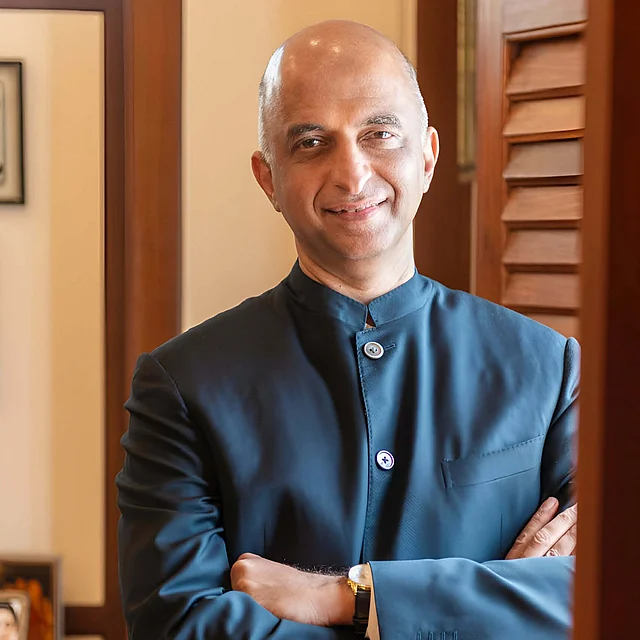Media Coverage
Godavari Biorefineries Reports Strong Q3 FY26 Performance with Improved Profitability and Margin Expansion
themachinemaker.com |
Feb 14, 2026
Godavari Biorefineries Limited (GBL), a leading ethanol producer and a pioneer in bio-based specialty chemicals in India, announced strong financial results for the third quarter of FY26, reflecting higher profitability, improved margins and steady progress in strategic initiatives. For the quarter ended Q3 FY26, the company recorded total income of ₹461.9 crore compared with ₹450.8 crore in the same period last year. EBITDA rose 13.8 percent year-on-year to ₹45.1 crore, while EBITDA margin improved to 9.8 percent from 8.8 percent a year earlier. Profit before tax, excluding exceptional items, increased sharply to ₹21.4 crore, up 152.2 percent year-on-year.
During the first nine months of FY26, GBL reported total income of ₹1,430.2 crore and EBITDA of ₹47.2 crore, compared with a loss of ₹1.4 crore in the corresponding period last year. Loss before tax, excluding exceptional items, narrowed significantly to ₹31.2 crore from ₹97.3 crore in 9M FY25.
The bio-based chemicals segment delivered strong growth, supported by rising demand for specialty chemicals. The sugar and cogeneration business also reported higher earnings during the quarter, while the ethanol segment remained stable. Specialty chemicals accounted for 62 percent of the bio-based chemicals mix in the first nine months of FY26, and the company expects this contribution to increase further as it expands its portfolio of high-value products.
Commenting on the results, Chairman and Managing Director Samir Somaiya said the company achieved a significant improvement in profitability during Q3 FY26 through operating efficiency and careful execution, along with a sharper focus on high-margin products. He noted that finance costs declined by 46 percent year-on-year, reflecting efforts to strengthen cash flows and support growth.
Mr Somaiya also highlighted key developments during the quarter, including the grant of a U.S. patent for a novel anti-cancer compound targeting triple-negative breast cancer, demonstrating the company’s focus on research-led innovation. Progress continued on the DME-to-CO₂ technology initiative, with pilot plant activities underway.
GBL recently partnered with Synthomer to develop bio-based alternatives to fossil-based monomers. Synthomer is commercialising bio-based butyl acrylate using GBL’s bio-based butanol, helping accelerate the adoption of sustainable raw materials across industries.
The company’s consumer brand, Jivana, crossed ₹100 crore in revenue during the first nine months of FY26, marking steady growth in the retail segment. GBL’s fungible grain-based ethanol capacity is expected to be commissioned in Q1 FY27, positioning the company to benefit from the expansion of the ethanol blending programme and rising demand for maize-based ethanol.
With continued investment in technology, capacity optimisation and sustainability initiatives, Godavari Biorefineries aims to strengthen efficiency, manage seasonal fluctuations and expand its presence in bio-based specialty chemicals. The company believes these efforts will support long-term growth and value creation.
Godavari Biorefineries Limited is among the top ethanol manufacturers in India and a frontrunner in ethanol-based chemical production. The company’s diverse portfolio includes bio-based chemicals, sugar, rectified spirits, ethanol, multiple alcohol grades, and power. GBL is uniquely positioned in the Indian market with an extensive range of bio-based products such as MPO, natural 1,3-butylene glycol, ethyl vinyl ether, and others.
Source: themachinemaker.com
Share
Budget 2026 should focus on incentivizing E100-ready infrastructure: GBL Executive Director Dr. Sangeeta Srivastava
www.chinimandi.com |
Jan 19, 2026
The country is awaiting the upcoming Budget, which Finance Minister Nirmala Sitharaman is scheduled to present on February 1, 2026. Various sectors and industries are outlining their expectations ahead of the announcement.
The ethanol industry has sought greater focus on incentivizing E100-ready infrastructure and accelerating the mandate for Sustainable Aviation Fuel (SAF) to absorb the additional ethanol capacity in Budget 2026–27.
Dr. Sangeeta Srivastava, Executive Director, Godavari Biorefineries Ltd. (GBL), applauded the achievement of E20 blending ahead of schedule and said, “Having successfully achieved E20 blending ahead of schedule, India now faces a productive surplus that requires urgent demand-side policy innovation. Budget 2026 should focus on incentivizing E100-ready infrastructure and accelerating the mandate for Sustainable Aviation Fuel (SAF) to absorb this additional ethanol capacity. It will lead to a strategic shift toward ethanol-to-chemicals and high-value bio-based derivatives is essential.”
“This budget must provide the fiscal framework to transition from fuel blending to a global leadership role in the Sustainable Chemical economy,” she further added.
The Indian Sugar & Bio-Energy Manufacturers Association (ISMA) has also sought a budgetary outlay of ₹15,000–20,000 crore to support advanced biofuel projects, including second-generation ethanol and Sustainable Aviation Fuel (SAF), as the sugar industry grapples with surplus production, weak prices, and constraints on ethanol diversion.
The OMCs have allocated around 1,048 crore litres of ethanol against 1,776 crore litres of offers submitted by manufacturers across the country for ESY 2025–26 (Cycle 1). OMCs had invited tenders for the supply of 1,050 crore litres of ethanol for ESY 2025–26.
In the allocation, maize holds the largest share at 45.68 per cent (around 478.9 crore litres), followed by FCI rice at 22.25 per cent (around 233.3 crore litres), sugarcane juice at 15.82 per cent (around 165.9 crore litres), B-heavy molasses at 10.54 per cent (around 110.5 crore litres), damaged food grains at 4.54 per cent (around 47.6 crore litres), and C-heavy molasses at 1.16 per cent (around 12.2 crore litres).
Currently, India’s total ethanol production capacity as of November 2025 is about 1,990 crore litres, and the industry is calling for an increase in ethanol blending beyond 20 per cent, stating that capacities are underutilised.
The budget push comes at a time when the sugar industry is navigating what the industry has described as a challenging phase, despite strong production.
Source:ChiniMandi.com
Share
Samir Somaiya becomes first Indian to receive Plinio Nastari Sugar Excellence Award
www.chinimandi.com |
Dec 12, 2025
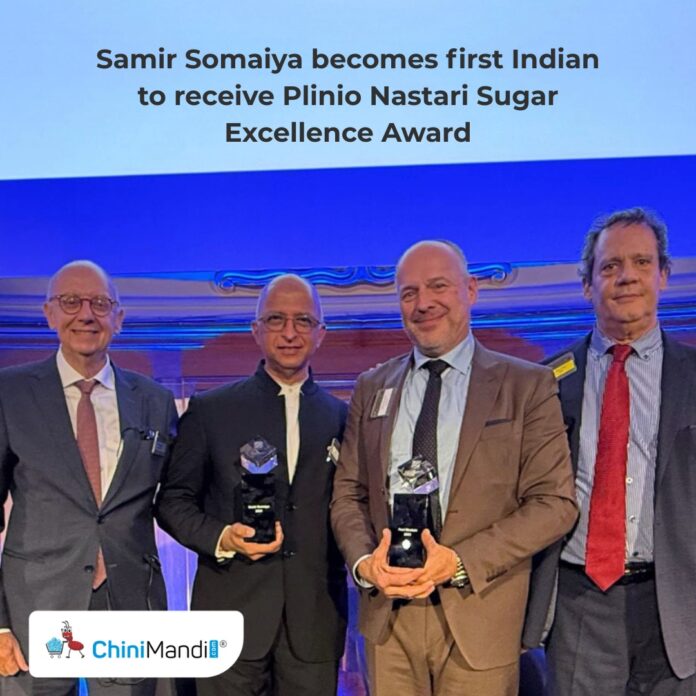
Samir Shantilal Somaiya, Chairman and Managing Director of Godavari Biorefineries Ltd. (GBL), has received the Plinio Nastari Sugar Excellence Award from the International Sugar Organisation (ISO) at the 34th ISO International Seminar in Westminster, London. The award was instituted by ISO, under the theme “Sustainable Solutions for Sugar & Energy”, to recognise outstanding achievement in the world of sugar & bioenergy. He is the first Indian to receive this recognition, marking a key moment for India’s sugar, ethanol and bioenergy sectors on the global stage.
At the ceremony, Mr Somaiya reflected on the link between economic progress and social development, referencing the legacy of his grandfather, who established the Somaiya family’s first school in 1942 to ensure education advanced alongside industry. He highlighted the importance of soil health, agricultural ecosystems and farmer livelihoods in shaping a sustainable future, underscoring that the green transition is essential both for climate goals and for securing incomes for small farmers.
He added, “Today, the green transition is essential to mitigate climate change, and in countries like ours with so many small farmers, it directly strengthens their income security and long-term resilience. I am humbled to receive this award on behalf of my company, my organisation and my country. My grandfather and father taught me that business is an agent of social change — that financial growth must move together with social and environmental progress. I love the world we are in: the smell of the earth in the morning, the sweetness and smiles that sugar brings to our lives. It is our duty to ensure the world we pass on remains sustainable, inclusive and as (if not more) beautiful as we found it.”
Under his leadership, GBL has developed one of India’s most integrated biorefining ecosystems, combining agriculture, green chemistry, renewable energy and rural development. The company works with more than 20,000 farmers across 200+ villages to improve yields, strengthen climate resilience and support regenerative cultivation.
Key recent initiatives and recognitions under his leadership include:
Commissioning a multi-purpose speciality bio-chemical plant in Maharashtra to produce renewable, bio-based ingredients used across coatings, resins, cosmetics, pharmaceuticals and fragrances.
Strengthening biotechnology through Sathgen Therapeutics, including advanced research on therapies for difficult-to-treat cancers and the establishment of Sathgen Therapeutics LLC in Princeton, USA, for global collaboration.
Launching the CO₂-to-DME pilot plant with ICT Mumbai, a scalable pathway to converting industrial emissions into clean fuel and chemical feedstock.
Mr Somaiya was also awarded the Rasayan Udyog Ratna Award by the Indian Chemical Society for his contributions to sustainable chemistry.
These initiatives reflect a leadership approach rooted in scientific depth, farmer-focused development and alignment with India’s renewable-energy and bioeconomy priorities.
Source:ChiniMandi.com
Share
GBL's breakthrough in climate action-Two months after Business India’s report on GBL-the company launches a pilot DME plant
businessindia.co |
Dec 10, 2025

In a decisive stride towards combating climate change, Godavari Bio-refineries Limited (GBL), under the leadership of CMD Samir Somaiya, has announced the launch of a ground-breaking pilot project that transforms greenhouse gases into a sustainable, clean fuel. It will convert industrial carbon dioxide (CO2) emissions directly into dimethyl ether (DME) – a low-emission, eco-friendly energy carrier, which is a clean-burning fuel capable of effectively replacing conventional energy sources, such as liquefied petroleum gas (LPG) and diesel. It, therefore, contributes towards reduced emissions, improved environmental performance and decarbonisation. In addition to its role as a fuel, DME serves as a versatile chemical feedstock too, supporting a wide range of industrial applications and chemical synthesis processes.
GBL, a listed entity is the flagship company of the Somaiya group and a leading integrated bio-refinery specialising in bio-based chemicals, ethanol and sugar & power production. It is one of the largest producers of ethanol and a pioneer in manufacturing ethanol-based chemicals in India. The company operates facilities in Sakarwadi, Maharashtra, and Sameerwadi, Karnataka, as also three advanced R&D facilities in Mumbai and plant locations.
“Living sustainably and being one with nature is the only way forward,” emphasises Somaiya. “There is no alternative if we are to preserve our planet for future generations.”
Shaping the future Meanwhile, the company is partnering with the Institute of Chemical Technology (ICT), Mumbai, to develop this innovative process, which will address the urgent need to reduce greenhouse gases and create value from waste. Shaping the future by addressing the challenges India is facing – finding itself at the crux of three defining challenges: securing energy in a volatile geopolitical context, addressing the global imperative of climate change and ensuring rural prosperity by securing the income and dignity of its small farmers. “India’s strength lies in its soil, the sun and the small farmers,” adds Somaiya. “Our nation’s energy transition must use these inherent assets to secure and improve farmer incomes, boost energy security and combat climate change together”.
India has progressed swiftly in blending fuel and ethanol (from 4 per cent to 20 per cent in just eight years), which exemplifies the nation’s bold approach. “Recent offers in response to the tenders floated by the OMCs can further increase the ethanol blend to 30 per cent – which is equal to 17.75 billion litres, outstripping the current tender of 10.5 billion litres,” informs Somaiya. “This surplus availability has to be seen as an asset, as it is an opportunity to incentivise all forms of clean-energy vehicles – EVs, flex fuels, CBG and, in the future, DME. Our path is clear: there is no real alternative but to transition from fossil to renewable. The only way to live – one with nature, sustainably and make this planet a beautiful place to live in”.
This pioneering technology was introduced by G. D. Yadav, professor, ICT, Mumbai, and his research team. Yadav is recognised for his outstanding contributions to chemical engineering and sustainable processes, and he is supported by a team of experts dedicated to cutting-edge catalyst development and process optimisation.
On the industry side, the team at GBL has played a crucial role in steering this project towards practical, scalable implementation, ensuring alignment with industrial standards and commercial viability. “We already have a presence in global supply chains and, with increasing investments in technology and innovation, we can take the lead in offering sustainable solutions,” explains Sangeeta Srivastava, ED, GBL. “The focus on clean energy, environmental responsibility and circularity in India is driving the industry forward, making India an attractive player in the global biochemicals market”. GBL is one of India’s largest integrated bio-refineries, servicing clients across 20 countries.
Somaiya’s unwavering faith in ‘living in harmony with nature’ drives GBL’s commitment to sustainability, regenerative agriculture and circular economy principles, not to mention the contribution to India’s farmer economy. This partnership with ICT underscores a shared mission: innovation for society and the planet, not only limited to GBL and India but also for the world at large.
Click here to view the full content.
Source: Businessindia.co
Share
Ethanol strengthens our energy security and reduces dependence on fossil fuels
Oct 24, 2025

DR. SANGEETA SRIVASTAVA Executive Director, Godavari Biorefineries Limited
Mumbai-headquartered Godavari Biorefineries began its journey in 1939 as The Godavari Sugar Mills and has steadily evolved into one of India's most integrated biorefineries. In line with the Centre's ethanol blending programme, Godavari Biorefineries is working on producing ethanol from sugarcane at its Sameerwadi facility in Karnataka, with key focus on sustainability measures. Speaking with AgroSpectrum, Dr Sangeeta Srivastava, Executive Director, Godavari Biorefineries Limited (GBL), reveals more about the innovations for the agri sector, the growth plans, and how ethanol from sugarcane could become a gamechanger, Edited excerpts:
Could you take us through your journey since inception?
Our journey has been one of resilience and transformation. We began in 1939 as The Godavari Sugar Mills and have steadily evolved into one of India's most integrated biorefineries. Today, we operate out of Sameerwadi in Karnataka and Sakarwadi in Maharashtra, and have a very diverse portfolio. It ranges from sugar, ethanol, rectified spirits, renewable power, and advanced bio-based chemicals such as MPO, natural 1,3 butylene glycol and ethyl vinyl ether.
These products serve critical industries like pharmaceuticals, food, fragrances, coatings, and personal care. We export to more than 20 countries, and what really differentiates us is our ability to combine science, scale, and sustainability. Our focus on research has led to patents in advanced molecules and bio-chemicals, which reflects the spirit of evolution that defines our journey.
How do you foresee the future of ethanol from sugarcane in the long run, especially in the agri industry?
Ethanol has a critical role in India's energy transition, and the government's ethanol blending programme is a national priority. This is because it strengthens our energy security and reduces dependence on fossil fuels. More importantly, it gives sugarcane farmers an additional and stable source of income beyond sugar.
In 2024-25, we achieved a record cane crushing of 24.65 lakh tonne at our Sameerwadi facility, which helped us maximise ethanol production. This ensures that sugarcane by-products are fully utilised during the crushing season.
In the long run, sugarcane ethanol will continue to play an essential role, but we also see it being complemented by grain and maize based ethanol, creating a multi-feedstock ecosystem.
Our upcoming 200 KLPD grain-based facility will help build a multi-feedstock ecosystem, a more resilient and circular agri-economy that strengthens farmer incomes while reducing greenhouse gas emissions and advances India's journey towards net zero.
What are your current sustainability and circular economy practices, and for the future?
For us, sustainability is not an initiative; it's at the heart of how we operate. Every part of the sugarcane is put to use. Bagasse is converted into renewable power, molasses and juice go into ethanol, and other by-products are converted into fertilisers, chemicals, or even energy inputs. By extracting maximum value, we ensure nothing goes to waste.
Across our operations, we're constantly working on energy efficiency, emission reduction, and water conservation. At the product level, we're innovating with renewable solvents, intermediates, and other bio-based chemicals that are made entirely from sugarcane feedstocks. Looking ahead, we are scaling microbial fermentation and biotransformation technologies.
What plans do you have for the existing and upcoming plants, if any?
Ethanol production is concentrated at our Sameerwadi facility in Karnataka, which is one of the country's largest integrated sugar and ethanol complexes. In FY25, we achieved a record cane crush of 24.65 lakh tonne, among the highest single-factory crushes in India, which enabled us to maximise ethanol output.
Looking ahead, we are investing in a 200 KLPD maize/grain-based distillery, which is expected to be commissioned by the end of the year. We are exploring a multi-feedstock approach, which gives us resilience and flexibility. At the same time, we continue to debottleneck and expand our specialty product capacities.
Any global expansion plans on the anvil?
Our strategy is two-fold. Domestically, we're focussed on supporting India's ethanol blending programme. Globally, we see ethanol as a building block for bio-based specialty chemicals and intermediates. Markets in Europe and North America are very promising due to their favorable regulatory thrust for bio-based options.
We are also growing our presence in industries with high growth like pharmaceuticals, cosmetics, food, fragrance, and coatings. In addition to ethanol, we are investing in microbial fermentation and regenerative agriculture. In the long term, our vision is to make Godavari Biofineries a consistent global supplier of sustainable and renewable inputs.
Ethanol manufacturing is expected to see strong growth as its use in petrol increases. How do you plan to grab this opportunity?
The demand for ethanol is accelerating, with India already achieving the 20 per cent blending target five years ahead of schedule, and the Government is now considering a higher percentage of blending. At Sameerwadi, we produced 84,038 KL of ethanol in FY25, despite temporary restrictions on the use of cane juice, which have since been restored.
• To capture future opportunities, we are: Expanding feedstock flexibility through a 200 KLPD maize/grain-based distillery, expected to be commissioned by the end of the year.This will ensure year-round operations and reduce climate and policy risks.
• Optimising capacity utilisation by maximising the use of cane juice, B-heavy molasses, and grains.
• Diversifying markets by producing ENA, which reduces dependence on any single segment.
Our strategy goes beyond fuel. Ethanol is also a feedstock for higher-value bio-based chemicals, ensuring that while we meet India's energy transition goals, we also build a strong global pipeline of green chemistry products.
How are you able to enhance the production of sugarcane molasses?
At Godavari Biorefineries, our approach is to maximise cane utilisation and improve yields at the farm level, since molasses availability is directly linked to cane crushing. In FY25, we achieved a record cane crush of 24.65 lakh tonne at Sameerwadi - among the highest single-factory crushes in India. This was particularly noteworthy because overall Indian sugarcane crush declined compared to the previous season, yet we increased throughput.
Our work with farmers through the K..J. Somaiya Institute of Applied Agricultural Research (KIAAR) focuses on regenerative farming, soil health, water efficiency, and intercropping practices. These initiatives help increase cane yield and sugar recovery, which in turn ensures higher and more consistent molasses generation for ethanol. Looking ahead, by diversifying into multi-feedstock ethanol (maize and grains), we are also de-risking seasonal variability in molasses supply while still strengthening our sugarcane value chain.
What are your sustainable measures in ethanol production?
Sustainability is embedded across our ethanol value chain. At Sameerwadi, every part of the sugarcane is utilised - juice and B-heavy molasses go into ethanol, bagasse generates renewable power, and press mud is converted into biogas or organic fertiliser.
This circular approach ensures minimal waste. In FY25, 84 per cent of our total energy consumption came from renewable sources, primarily bagasse and biogas, and we increased solar power usage over the previous year. Beyond operations, we work closely with farmers and institutions like KIAAR to promote regenerative agriculture that improves soil health, crop yield, and water-use efficiency strengthening the long-term sustainability of ethanol feedstock.
During the FY ending March 31, 2025, ethanol production was at 84,038 KL as compared to 95,168 KL. What is the reason behind this dip?
The reduction in ethanol production in FY25 was primarily due to temporary restrictions on the use of sugarcane juice for ethanol under the Government's Ethanol Blending Programme.
This was implemented in the previous season because of concerns around domestic sugar availability, which resulted in lower molasses stock for the FY ending March 31,2025.
However, following a good monsoon and improved cane crop outlook, the government restored the use of sugarcane juice for ethanol production in 2024-25. With this policy back in place, and with our upcoming 200 KLPD maize/grain-based distillery scheduled for commissioning by the end of the year, we expect ethanol production to increase and become more resilient through a multi-feedstock approach.
What will be Godavari Biorefineries' innovations for the agri sector?
Innovation has always been at the heart of Godavari. We have over 50 scientists in our R&D team who are working on bio-based products that can substitute fossil-based products and adding value to bio-based feedstocks. Our biofinery model is designed to extract maximum value from sugarcane. Beyond sugar and ethanol, we work with bagasse to generate power, develop natural waxes, produce compost, and even launch branded food products under the Jivana label.
We are also innovating in specialty chemicals used in different Industrial segments such as fragrance and beauty ingredients, natural skin-friendly emollients, green solvents, phthalate-free plasticizers, and safer mining frothers. These are all designed to be sustainable and value-added, creating benefits both for agriculture and for downstream industries.
What initiatives have you set in motion for the future?
Our bio-based chemicals segment continues to be a strategic pivot for growth and transition, while the making of ethanol remains another key driver. With our multi-feedstock capabilities, we are unlocking new avenues and contributing meaningfully to India's energy transition.
We are also growing our consumer facing brand Jivana while embedding sustainability at the core of our operations. With over 84 per cent of our energy sourced from renewables and a significant reduction in water use, our aim is to create long-term value by combining science, scale, and sustainability.
Share
Godavari Biorefineries Limited recognised with ICC – K. V. Mariwala Award for Industry–Academia Partnership
chinimandi.com |
Sep 23, 2025
Godavari Biorefineries Limited (GBL) (BSE: Script Code 544279 | NSE:GODAVRIB), has been honoured at the 60th Annual ICC Awards, 2025, held at Taj Lands End, Mumbai on 19th September 2025. The company was awarded the prestigious ICC – K. V. Mariwala Award for Effective Chemical Industry–Academia Partnership, along with the Institute of Chemical Technology (ICT), Mumbai. This recognizes GBL’s leadership in forging strong industry-academia linkages, advancing green technologies, and fostering innovation in India’s chemical sector.
The technology converts CO₂ into di-methyl ether (DME) using ICT’s breakthrough single-step catalytic conversion process, which is more efficient and cost-effective than conventional methods. DME is a clean fuel and versatile chemical feedstock, serving as a substitute for LPG and diesel while also supporting chemical synthesis applications. The technology has been jointly developed by Godavari Biorefineries Ltd. (GBL) and the Institute of Chemical Technology (ICT), Mumbai, under the strong guidance of Prof. G. D. Yadav and the personal commitment of Mr. Samir Somaiya, CMD, GBL. GBL’s ethanol fermentation generates Biogenic CO2 that can be usefully converted to DME.
Commenting on the recognition, Shri Samir Somaiya, Chairman & Managing Director, GBL, said, “We are honored to receive this recognition and extend our sincere thanks to the Indian Chemical Council. This award reflects our longstanding collaboration with ICT Mumbai—a valued partner in research, innovation, and knowledge creation. At GBL, we remain firmly committed to sustainability, renewable chemistry, and the principles of a circular economy. We believe that strong industry–academia partnerships are key to enhancing India’s competitiveness and tackling global sustainability challenges. We will continue to invest in research, innovation, and collaborations that pave the way for a greener, more sustainable future.”
The ICC – K.V. Mariwala Award, granted by the Indian Chemical Council (ICC) identifies transformative partnerships between industry and academia that initiate innovative solutions, stimulate technology transfer, and enable practical applications. By linking research to industrial practice, the award fuels the creation of advanced processes, future leadership pipelines, and sustainable technologies. GBL’s partnership with ICT Mumbai was highlighted at the Awards seminar by Mr. Ramnath Kadam, Sr. Manager–Process Engineer, GBL, and Padmashri Prof. Dr. G. D. Yadav, Emeritus Professor of Eminence, ICT Mumbai.
GBL is at the forefront of renewable chemicals, green technologies, and biofuels, transforming agro-based raw materials into sustainable products. The company also fosters knowledge networks and develops emerging talent through collaborations with academic institutions, driving sustainability and responsible growth for industry and society.
Source:ChiniMandi.com
Share
GBL Bets On Biochemicals While Ethanol Acts As Safety Net
businessworld.in |
Sep 01, 2025
Executive Director Sangeeta Srivastava says that ethanol remains a safety net as the company expands feedstock flexibility and bio-based product portfolio
Godavari Biorefineries (GBL) is betting big on bio-based chemicals as the next growth engine, with plans to triple its earnings before interest, taxes, depreciation, and amortisation (EBITDA) between FY25 and FY29. Executive Director Sangeeta Srivastava said the company sees ethanol as a stabilising pillar under India’ s blending programme but is directing future capital towards biochemicals to align with global decarbonisation trends
“ We believe ethanol gives us financial and operational security, but our growth will come from biochemicals, ” Srivastava told BW Businessworld in an interview. “ We maintain only a minimum balance in sugar, while ethanol provides stability. Chemicals are where the real growth lies.”
Ethanol As Safety Net, Biochemicals As Growth Driver
GBL operates across sugar, power, chemicals, and distillery segments. Its capital deployment, Srivastava said, is now guided by a philosophy that prioritises ethanol as a buffer and chemicals as a long-term value creator. “ We aim to decarbonise the chemical value chain through co-creation with customers, bringing in bio-based carbon for drop-in molecules, ” she noted.
With India’ s ethanol blending target recently raised to 30 per cent, GBL continues to supply about 85– 90 per cent of its ethanol to the programme. But the company has been diversifying uses, reducing dependence on the policy while supporting energy security and farmer incomes.
To enhance operational resilience, Srivastav said that GBL is investing Rs 130 crore in a new 200 KLPD grain- and maize-based ethanol facility. This will supplement sugarcane-based operations and extend plant utilisation beyond the traditional crushing season.
“ Sugarcane operations typically run for 130– 140 days, but with grain feedstock we can operate longer, ensuring better asset utilisation, ” Srivastava said. “ Availability of corn in the same region protects us from supply disruptions, while flexibility allows us to integrate multiple feedstocks smoothly.”
This move, she added, will not only help meet government blending targets but also shield operations from climate and seasonal risks.
Strengthening Farmer Partnerships
GBL’ s growth strategy also hinges on securing sustainable feedstock through deep engagement with farmers. The company established an independent Agricultural Research Institute at Sameerwadi, Karnataka, which works with scientists and cultivators to improve cane varieties, soil fertility, and crop resilience.
“ Our journey began with farm-level innovation to enhance soil health and continues today with collaborations with institutions like Somaiya Vidyavihar University and Michigan State University, ” Srivastava said. “ We are adopting both traditional practices, such as Panchagavya and modern scientific methods to retain soil carbon.”
She said that GBL is positioning itself as an import-substitution player in bio-based chemicals. One recent success is the commercialisation of Ethyl Vinyl Ether - previously fully imported into India and largely fossil-based. “ We developed and scaled this bio-based product in-house, ensuring it met customer specifications. It has now been approved by Indian buyers and international partners, ” she added.
Looking ahead, the company is targeting bio-butanol as a major growth molecule. “ We have communicated to investors that from FY25 to FY29, we aim to achieve 3 times EBITDA, with bio-butanol playing a significant role, ” she added.
ESG And Sustainability Priorities
“ All our facilities are zero-liquid-discharge, with 84 per cent of our energy coming from biomass and nearly all water recycled, ” she noted. “ We run schools in factory areas, train local communities, and ensure environmental awareness. ESG is not just a compliance requirement but part of how we create value.”
On the future of India’ s biochemical sector, Srivastava said the global shift towards decarbonisation has opened a window of opportunity for Indian producers. “ India has abundant biomass and the capability to convert it into products. If supported with the right incentives, we can be a global supplier of green carbon, ” she said.
She stressed that the world is looking for fossil replacements. The growth potential is enormous, and India can play a much bigger role in embedding bio-based carbon into global value chains.
Source: businessworld.in
Share
Godavari Biorefineries drives innovation in renewable materials
businessindia.co |
Jul 10, 2025

GBL is a producer of ethanol and a pioneer in ethanol-based chemical manufacturing in India
Looking at the increase in the biochemicals market, GBL is invested in capacity and innovation
Today, the world is seeking greener and renewable feedstocks in its search for sustainability. India holds immense potential in the biochemicals and renewable materials space, largely due to the country’s rich agricultural resources and the increasing need for sustainable solutions. With the growing demand, as well as investments in capacity and innovation, India is well-positioned to become a leader in this sector.
“We already have a presence in global supply chains, and with increasing investments in technology and innovation, we can take the lead in offering sustainable solutions. The focus on clean energy, environmental responsibility, and circularity in India is driving the industry forward, making India an attractive player in the global biochemicals market,” explains Dr Sangeeta Srivastava, ED at Godavari Biorefineries Limited (GBL).
With a PhD in organic chemistry and over 28 years of experience, she has been instrumental in driving innovation, sustainability, and ESG alignment at the company. A holder of 19 Indian patents and a respected voice in national industry forums, Srivastava brings a unique blend of scientific acumen and strategic leadership to the evolving landscape of biorefining.
“GBL offered me a valuable platform to explore the world of research while broadening my perspective beyond the laboratory. Although I joined as a technical officer, I was encouraged to engage with cross-functional teams and senior leadership, which deepened my understanding of how businesses operate holistically. At GBL, I learned that being hands-on is a critical trait of effective leadership. Equally important is taking ownership, of both success and failure, with passion and accountability,” she adds.
GBL is a producer of ethanol and a pioneer in ethanol-based chemical manufacturing in India. Its diversified product portfolio comprises bio-based chemicals, sugar, rectified spirits, ethanol, other grades of alcohol, and power. It is the only company in India to have such a vast portfolio of bio-based products such as MPO, natural 1,3 butylene glycol, ethyl vinyl ether, and other bio-based chemicals.
Financials speak
GBL recently declared its results. For Q4 FY25, with an operating profit (EBITDA) margin of 21 per cent and a profit after tax (PAT) margin of 16.6 per cent, reflecting operational efficiency and strategic execution, the company demonstrated a strong performance. In fact, the revenue from operations stood at Rs579.5 crore in Q4 FY25, compared to Rs615.2 crore in Q4 FY24. EBITDA was Rs121.7 crore, and PAT stood at Rs96.4 crore.
Speaking on the results, Samir Somaiya, CMD says: “FY25 was a defining year for GBL, showcasing our agility, disciplined execution, and strategic progress. Our bio-based chemicals segment delivered over two times growth in EBITDA, propelled by our shift towards high-value, sustainable solutions and enhanced operational efficiencies. We also achieved a record cane crushing of 24.65 lakh tonnes for sugar season 2024-25 at our Sameerwadi facility. The restoration of the ethanol blending programme using sugarcane juice enabled us to better utilise our ethanol capacity during the crushing season.”
Srivatsava: a unique blend of scientific acumen and strategic leadership
Somaiya also serves as Chancellor of Somaiya Vidyavihar University, President of Somaiya Vidyavihar, and Chairman of Somaiya Trust and the KJ Somaiya Trust, among other roles. Over a career spanning close to 30 years, he has focused on a multitude of sectors from rural development and education to manufacturing. In 1993, he joined GBL and has taken the company forward through a focus on economic, social and environmental sustainability supported by research and innovation. Under his guidance, institutions under the Somaiya umbrella manage over 30 educational institutions, including the University.
Capital allocation
GBL has invested in capacity and innovation. But what guides this capital allocation and investment strategy? Says Srivastava: “Our capital allocation strategy at GBL is driven by two primary factors: sustainability and innovation. We are focused on enhancing our production capabilities and expanding into new product categories that align with global sustainability trends. Our investment strategy is also guided by the potential to create long-term value through co-creating with our customers. By integrating renewable materials into various industries – whether it’s for bio-based solvents, chemicals, or packaging – we aim to create scalable, sustainable solutions that meet both regulatory requirements and market demands.”
She adds: “For GBL, innovation starts at the farms where we generate our feedstock, gets created in the lab and takes shape with customers’ inputs. Such innovation, paired with smart capacity building, enables us to stay ahead of the curve and cater to emerging global needs.”
Meanwhile, the company has announced that its European patent for a novel anti-cancer molecule has been validated in Spain, the United Kingdom, and as a Unitary Patent covering multiple EU member states. This milestone underscores the company’s growing presence in high-impact scientific innovation, led by its dedicated Anti-Cancer Research segment.
The patented molecule has demonstrated efficacy against both cancer cells and cancer stem cells, marking a promising advance towards more targeted and effective cancer therapies. It has shown potential in the treatment of various cancers, including breast and prostate cancer, with encouraging efficacy and safety profiles in preclinical animal studies. The molecule is currently in Phase 1a clinical trials to assess safety in human patients with advanced solid tumours as well as in healthy volunteers.
“This patent validation marks a significant milestone in our journey towards advancing original, high-quality scientific research,” said Srivastava. “It reflects the dedication of our teams and our aspiration to contribute meaningfully to global knowledge and innovation,” she added.
Somaiya: seeing a strong momentum
GBL’s products are in sectors – pharma, cosmetics, food and fragrance, coatings – which are the key growth drivers for bio-based solutions. “We see strong momentum in several sectors, particularly in cosmetics, personal care, and pharmaceuticals,” says Somaiya. He sees the rising consumer awareness and regulatory shifts; these industries are increasingly prioritising sustainability and safety. 1,3 Butylene glycol, for instance, is already used in a wide range of personal care products, including skincare, haircare, and cosmetics. These are highly sensitive formulations where safety, stability, and efficacy are non-negotiable.
“We work closely with our clients in these sectors to provide bio-based ingredients that contribute to not just performance but also compliance and consumer trust. As global demand for clean-label and sustainable products grows, we see our solutions playing an increasingly strategic role,” discloses Srivastava.
As GBL moves forward, it is placing bold bets on advancing its bio-based product portfolio, with a focus on sustainable materials and new technologies such as microbial fermentation technologies and biotransformation. “We are also expanding our geographic reach to markets that are increasingly emphasising sustainable solutions, especially in Europe and North America. These regions have strong regulatory frameworks supporting the use of bio-based chemicals, and we are looking to increase our presence there,” explains Srivastava, exploring new verticals, particularly in advanced materials and sustainable agriculture. “By diversifying into new product categories, we aim to offer holistic solutions that not only cater to existing industries but also unlock entirely new markets for sustainable bio-based products.”
Now, the Government of India is promoting ethanol production as announced in the ‘Roadmap for Ethanol Blending’. This ethanol blending programme helps India meet its energy security, combat climate change, and ensure farmer incomes. In line with this policy, GBL expanded its ethanol capacity from 2 lakh litres per day to 4 lakh lpd. The company is now planning to increase capacity to 6 lakh lpd in the next few months. More than 40 per cent of the sugarcane feed to Godavari will be diverted to make ethanol.
“Looking ahead, our 200 KLPD grain/maize distillery is progressing as planned and is expected to be commissioned in Q4 FY26. We are also exploring multi-feedstock options for greater flexibility, while undertaking debottlenecking and expansion initiatives focused on specialty products. FY25 has laid a solid foundation for future growth, and we remain committed to delivering value through innovation, sustainability, and disciplined growth,” concludes Somaiya, a squash enthusiast, yoga practitioner, swimmer, and black belt in Taekwondo.
Source: businessindia.co
Share
Godavari Biorefineries' patent for anticancer molecule validated in Spain, UK and EU
Jul 07, 2025
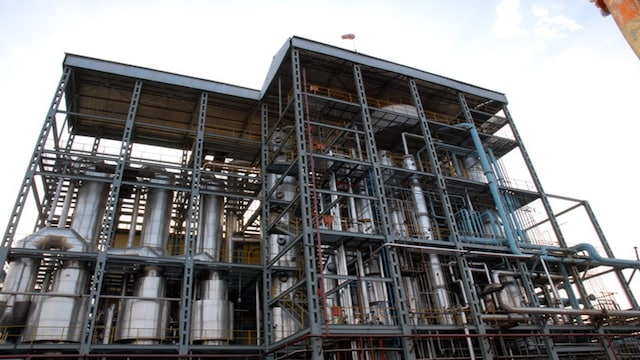
Godavari Biorefineries on Monday (July 7) announced that its European patent for a novel anti-cancer molecule has been successfully validated in Spain, the United Kingdom, and as a unitary patent across multiple European Union member states.
The patent validation marks a significant development in the company’s efforts within its anti-cancer research segment and strengthens its footprint in high-impact scientific innovation.
In a stock exchange filing, Godavari Biorefineries said that the patented molecule has demonstrated efficacy against both cancer cells and cancer stem cells and is being explored as a potential therapy for various cancers, including breast and prostate cancer.
Preclinical animal studies have shown promising results in terms of efficacy and safety, the company informed the bourses.
The molecule is currently undergoing Phase 1a clinical trials to evaluate its safety in patients with advanced solid tumours and healthy volunteers.
“This patent validation marks a significant milestone in our journey toward advancing original, high-quality scientific research,” said Sangeeta Srivastava, Executive Director, Godavari Biorefineries Limited.
"It reflects the dedication of our teams and our aspiration to contribute meaningfully to global knowledge and innovation," she added.
Godavari Biorefineries has a global footprint, exporting to over 20 countries and maintaining strong collaborations with international research and development networks. Its clinical-stage biotech division, Sathgen Therapeutics, is leading the advancement of novel cancer and antiviral treatments.
With the lead molecule now under clinical evaluation and protected by global patents, the company is increasing its focus on translational research targeting critical global health challenges.
This development aligns with Godavari Biorefineries’ broader diversification into advanced scientific fields, complementing its existing leadership in ethanol, bio-based chemicals, and renewable materials derived from agricultural feedstocks.
Godavari Biorefineries is a pioneer in the renewable chemicals and biofuels sector.
Shares of Godavari Biorefineries were trading 0.81% lower at Rs 256.5 apiece on the BSE at around 10:02 AM.
Share
RISE OF BIO-BASED CHEMICALS: HYPE OR GAME-CHANGER?
Chemical Industry Outlook 2025, India Chemical News |
Jul 27, 2025
The latest BioE3 policy builds the framework for high-performance biomanufacturing to propel the development and production

DR. SANGEETA SRIVASTAVA Executive Director, Godavari Biorefineries Limited
The global and Indian bio-based chemicals market has enormous growth potential driven by a multitude of factors. The production of such chemicals depends on the availability of feedstock, and it is incumbent upon the stakeholders to manage all such components and ensure smooth processes to transition in a sustainable future.
COP 29 saw crucial strides in advancing climate action for developing countries but significant gaps remain. Issues like the scale of financing, the integrity of carbon markets, and concrete support for adaptation efforts require urgent attention and more decisive action. With Brazil hosting COP 30 this year, there is a critical opportunity to translate commitments into impactful solutions. As COP 30 approaches, the world will be watching to see whether this vital decade for climate action can deliver the results needed to protect the most vulnerable and secure a sustainable future for all.
The accelerated transformation towards a net zero circular economy is only feasible with a joint holistic approach to value chain collaboration. It became clear that alternative feedstocks, such as bio-based, CO2 -based and recycled feedstocks, are the key levers to enable this transformation.
The rise of bio-based chemicals is a game changer, and we do not have any other choice. We see slower growth towards adoption, but it is happening. We can adopt cleaner energy and recycling, but net zero will not be possible without de-fossilization. An integrated biorefinery is a step towards achieving this goal.
Defining Bio-based Chemicals
Such chemicals are usually produced through fermentation, enzymatic processes, chemical conversion, or biomass. They can be crops (including sugarcane, corn, soybeans), wood chips, lignin, algae, microbes, and organic waste.
Current State of the Market
With a global market size of over US $73 billion and a CAGR of 9.6% between 2024 and 2032, the popularity of bio-based chemicals is expected to increase further. Volatility in petrol and diesel prices, consumer preferences shifting to sustainable products, and depleting stock of non-renewables have fuelled the interest in these products. From the Indian perspective, the sector is also witnessing steady and robust growth with a strong CAGR and growth estimates.
Bio-based Chemicals and Biofuels
In the global economy, biotechnology has begun taking on a significant role. Bio-based chemicals and biofuels are connected through their shared feedstock use, standard processing techniques, and circular economy potential. However, the essential linkage is the role of integrated biorefineries in this process. For a biorefinery, it is necessary to be economical and to produce products at a price that customers would be keen to buy, which is the biggest challenge in the real world.
Each serves a different angle regarding ensuring sustainability across the value chain. Renewable fuels produce drastically less pollution compared to fossil fuels. At the same time, products developed from biochemicals help manage the waste generated from the process, help de-fossilization, and channel it into something productive.
Integrated Biorefinery Concept for Tomorrow
Integrated biorefinery processes are efficient for producing bio-based products and secondary energy carriers such as fuel, power, and heat, along with oil refineries. The pilot projects in India indicate that both conventional (biodiesel and ethanol) and advanced biofuels (of lignocellulosic origin) are yet to be produced profitably to create a sustainable market without implementing government policies and subsidies.
The integrated biorefinery concept enables the conversion of waste to high-value streams in economically attractive pathways by focusing on the key aspects: availability, affordability, sustainability, and productivity. As the world is going towards net zero, there should be a general (global) accepted policy of biogenic CO2 uptake calculation of different biomass crops. So, a biorefinery approach applied to different biomass crops will be more valued within climate policy.
Policies Pushing the Agenda
The Indian government, in a bid to accelerate the integrated bio-refinery agenda, has begun the Mission Integrated Bio-refineries Policy to also design innovative solutions in the sector. Ongoing bio-based innovations with enzymes would only foster and bolster these growth estimates.
In August 2024, the government launched the BioE3 Policy, which aims to channel the trickle-down impact of biotechnology on the economy, environment, and employment. This policy builds the framework for high-performance biomanufacturing, which will propel the development and production at the scale of bioproducts within the nation. With the nation's vast agricultural resources and burgeoning demand for fuel appropriately implemented, such a policy shift could radically change the economy.
The focus must be on strategies to manage the most potential source, i.e., agricultural residues. Some critical issues remain: deployment of existing technologies in agriculture, better agronomic and breeding technologies, proper supply chain, adequate policy framework, effective financing mechanism, and practical information dissemination. However, a policy like BioE3 could be instrumental in sparking sectors to tackle such obstacles.
Biofuels in India are crucial as they align with government initiatives such as Make in India, Swachh Bharat Abhiyan, Self-Reliant India, and skill development. They also offer opportunities to reduce imports, increase farmers' incomes, transform waste into wealth, and create employment.
Circular Economy and Biorefineries
In a broad future circular economy, biomass-originated chemicals will play a critical role. The products and processes to generate them from such materials are usually safe by design. Biorefinery systems will be vital to greater recycling and chemical and polymer production. To ensure a continuous fuel supply and to supplant the huge demand for emerging economies, economies have to be sustainable and circular - on one hand, manufacturing bio-based chemicals that have a wider use in products and bio-fuels that can reduce the dependency on fossil fuels. With both ranges of products, there can be a strong validation of the importance of bio-based products, possibly leading to production at scale.
Challenges Hindering Growth
Despite a promising scenario, there are some pertinent challenges that the industry needs to come together.
Feedstock Cost: Sugarcane molasses and other bio-based feedstocks compete with food production for land and resources. For countries with large populations like India, there are concerns that if the transition is rapid and sudden to bio-based feedstock cultivation, it could lead to price rise and adversely impact food security. Storing and transporting diverse feedstocks like cellulosic biomass could require substantial development and investment. In such cases, ensuring sustainable sourcing and proper resource utilization could be critical in elevating production and minimizing environmental impact.
Technology Constraints: Bio-based chemical manufacturers need to scale up rapidly to scale up rapidly and maintain cost-effectiveness. One way to do that would be through innovation and rapid advances. For production, efficient and affordable downstream processing is vital.
Management Issues: Transitioning to a bio-based future would require a skilled workforce with biotechnological experience. Proper waste management efforts are also essential in shoring up efficiencies in the bio-based production chain. These objectives would require close collaboration with multiple external stakeholders, government agencies, leading tech institutes, and private enterprises.
The Future of Chemicals is Green
Looking at the current state of affairs and the rise of biobased chemicals in the short term may seem like hype, but it is a game changer in the mid and long term. Countries and companies are sticking to their net zero and decarbonization goals. The global energy mix is observing a rapid transition to renewable fuels. While in its early stages, the market for bio-based chemicals in India shows genuine promise. Key stakeholders must come together to develop innovative alternatives that are marketable to the general public.
The sector needs better long-term planning and policies and technological solutions that are practical and effective in an actual life scenario. Lastly, while aim and vision should be high, the same can be done by taking small but concrete steps. It allows the ecosystem to grow while ensuring the penetration of fuel and technologies.
Click here to view the full content.
Source: Indian Chemical News
Share
Pages




